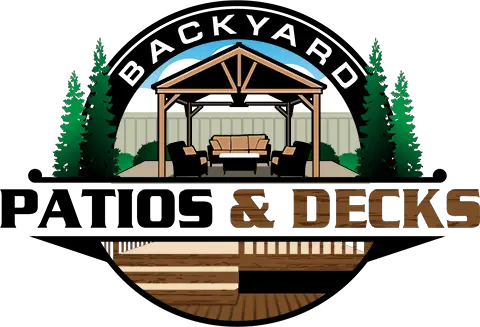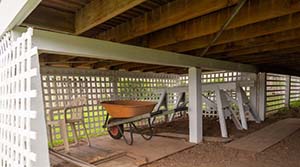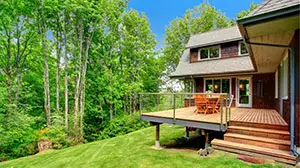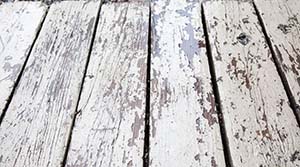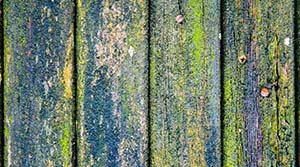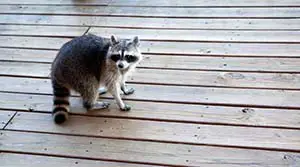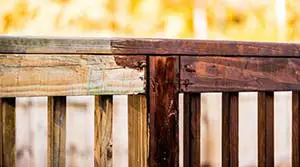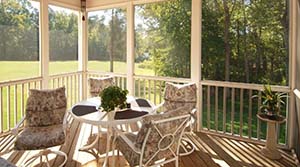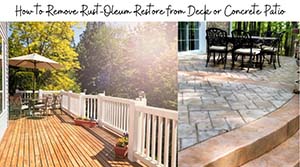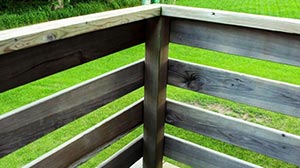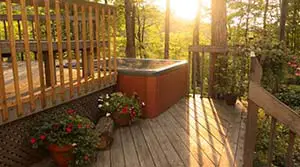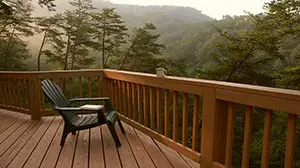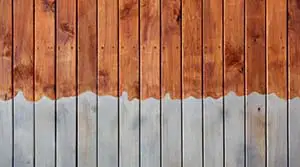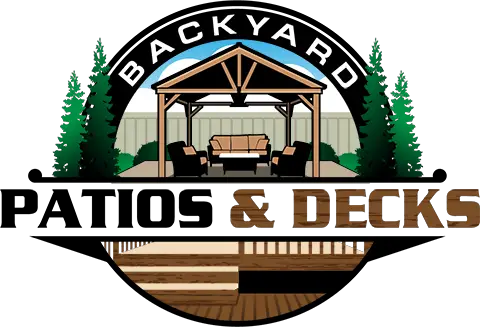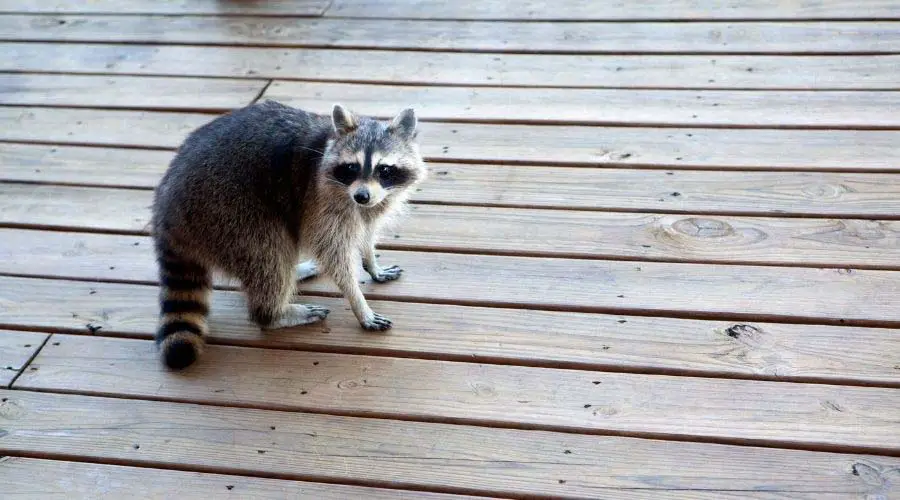
If you think raccoons have made your deck their home, you need to get rid of them. Take it from someone who had experienced getting pestered by raccoons when all I wanted was to sip coffee on my deck peacefully. Luckily, you have several approaches you can use to do so.
Below are some of the things you can do to get rid of raccoons from your deck:
- Remove the raccoon
- Remove a damaged vehicle from your property
- Get rid of vegetation or prune it
- Keep food away from raccoons
- Make your water features inaccessible
- Safeguard your deck posts
- Install or change your lighting system
- Plant beech trees
- Keep large dogs
- Store firewood the correct way
- Use raccoon repellants
- Raccoon-proof your deck and home
The last thing you should do is to befriend a raccoon. It poses a danger to you and your loved ones. In addition, it can compromise the integrity of your deck and home.
So, you need to ensure that you get rid of raccoons as soon as you spot their presence and take measures to get rid of them permanently.
This guide discusses the various ways you can keep these animals away from your deck.
Why Are Raccoons Not Good for Your Deck?
Some animals can be domesticated, but raccoons do not fall under that category. Having a raccoon as a pet or letting one live on your deck will cause more disadvantages than benefits. Here are some of them:
1. Raccoons Carry Dangerous Diseases
First, raccoons carry several diseases that can affect humans and their pets. These diseases may be passed in animal droppings or through other injuries the animal causes.
The most dangerous of them is rabies, which is almost always fatal if left untreated beyond its incubation period.
Raccoons can also spread an intestinal raccoon roundworm known as Baylisascaris and cause Leptospirosis. These diseases will make you ill.
In severe cases, Leptospirosis can cause liver and kidney. In addition, raccoons could cause canine distemper and infectious canine hepatitis in your pets.
2. Raccoons Can Cause Injuries
Generally, raccoons are nocturnal animals that are active at night. But if the opportunity presents itself, they may forage for food during the day, which is when you could encounter problems.
While healthy raccoons are unlikely to attack humans or pets, females with young ones nearby may end up being more aggressive than usual.
As a result, they may cause injuries. Also, rabid raccoons may attack for no reason and could end up putting you or your pet at risk of contracting rabies.
3. Raccoons Can Cause Property Damage
If raccoons invade your property, you will need to deal with the damage afterward. And it could be pretty costly if left unchecked for a long time.
A typical coon could chew your wooden deck posts or electrical wiring, break your piping, rip out the ductwork, tear your insulation, and leave your entire home smelly due to its droppings.
Signs of Raccoon Presence on Your Deck
You might see droppings on your deck or wake up to an upturned trash can every morning, but that does not immediately mean the raccoon is the culprit. Before doing any steps, know what you’re dealing with first. It can be a squirrel, a rabbit, or a rat.
Although there isn’t a sure sign it’s a raccoon except seeing it with your own eyes, here are a few things you should watch out for:
- Unexplained noises in your chimney and attic or on your roof.
- Strange noises underneath your deck.
- Upturned trash in your yard.
- A disturbed compost pile.
- Partially eaten plants in your home or garden.
- Missing eggs in your chicken coop.
- Missing pet food or bird food.
- Missing fish in your pond.
- Missing chicken or birds.
- Conical-shaped holes in your garden or lawn.
- Raccoons peeping into your home regularly.
- Torn insulation or ductwork in your home.
- Broken piping.
- Droppings around your woodpile or tree bases.
What Attracts Raccoons?
The kind of yard or deck you have determines largely how comfortable raccoons will be in it. If your property offers them all the things they find attractive, they will stay and make themselves comfortable. Your deck posts may end up being their playground.
For that reason, you need to be aware that raccoons find the following things attractive:
- Food: coons tend to favor sweet things like fruits. But they will also eat nuts, crayfish, frogs, insects, and small animals like birds and snakes. So, if your yard provides an excellent environment for raccoon prey, you can expect them to follow.
- Water: Raccoons drink water and wash their food with it. They also escape into the water if they feel threatened. Also, they consider water as a source of some of their foods, such as fish and frogs.
- Darkness and coziness: Coons prefer darkness to operate and dig burrows. For that reason, they are likely to be found nesting underneath decks, crawl spaces, tree hollows, storm drains, and in basements and attics. So, if your yard has plenty of cozy hiding spots where light does not reach, you will likely find a raccoon or two there.
- Vegetation: Raccoons are adept tree climbers and use trees are lookout spots for prey. But the base or hollow spots of some trees act as a place for them to create shelter. Furthermore, coons prefer to use trees to escape their predators. So, if they feel threatened, up the tree, they will run.
How to Keep Raccoons Away From Your Deck
Once you establish a raccoon problem, you can find ways to eliminate them. It would be best to employ various strategies because raccoons are animals that tend to adapt quickly to new environments. So, they can make formidable opponents.
Below includes some of the tricks I pulled off during my long battle with raccoons:

1. Consistently Scare Them Away
If you have raccoons in your home or yard, you must first remove them. In an ideal world, coons would disappear when you said, “Shoo!” but this is the real world.
You may need to put in considerable effort to get rid of the raccoons, especially if their hiding spot is in a tight space.
If a raccoon is hiding underneath your deck or somewhere else on the property, you would need to put a light close by, bang pots and pans and talk nearby to scare them, and soak a rag in ammonia solution and place it as close to the raccoon den as you possibly can.
You would need to do that for a few days and then wait and see if the animal moves out. But make sure you leave an exit point open for them to go.
You can block the den entry with folded newspapers and wait for about three days to confirm that the raccoon is gone. If the papers blocking the way are still intact, consider the coons gone, then take measures to keep them away.

2. Remove Unused Vehicles From Your Property
Concerning shelter, raccoons are opportunistic animals. They will create dens in practically any dark and comfortable spot. And that includes the written-off vehicles on your property.
Therefore, if you have unusable cars in your yard, now would be an excellent time to get rid of them. But ensure no raccoons are inside the vehicles. If they are, get rid of them first, then remove the cars.
Contact your local salvage yard if you have no idea where to take your unusable cars. You could end up making some money out of them while keeping your deck free from annoying coons.

3. Get Rid of Vegetation or Prune it
The woodier your property is, the more likely you will deal with raccoons in your deck and home.
Since coons are adept climbers, the animals will use any vegetation or structure in your yard to move around to other places and even shelter.
The closer the vegetation is to your home, the more likely coons will find their way into your outdoor living space.
You may want to cut or prune the trees or overhanging branches near your roof and deck for those reasons. If the raccoons do not have any vegetation they can escape to when they feel threatened, they will be less likely to stay around.

4. Keep Food Away From Raccoons
Because of how adaptable raccoons are regarding what they eat, you must take many measures to keep all food sources away from them. These small steps will let raccoons know that there is no food for them in your deck:
Manage Waste Properly
For starters, you should be careful about how you manage your waste. Coons tend to forage for food in the garbage. So, it would help if you keep your trash cans closed by using tight lids that the animals cannot open. But you can also secure the garbage cans to a strong post or wall and wire them shut.
Cover Your Compost
Second, you should keep your compost away from raccoons by using compost bins with tight lids. They like compost because it consists of vegetables and other scraps they consider food. Also, composting tends to attract worms, which coons eat.
Hide Your Bird Feeders & Pet Food
Another strategy to keep food away from raccoons is making your bird feeders and pet food inaccessible. That is because these animals will eat them.
So, it would help if you supervised your pets when they eat outdoors or let them eat indoors. When there is leftover food, you should not leave it within reach of raccoons.
As for birds, ensure you spice the birdfeed and bring in the birdfeeders at night or raccoon-proof them. You can do the latter by repositioning them so they are inaccessible to raccoons by hanging them on wires between two trees or securing them to a long thin pole.
Keep Coons Out of Your Coop
In addition, you should watch out for raccoon theft in your coops. If eggs and young chicken keep on missing, you should safeguard your chicken.
You could do that by installing a galvanized hardware cloth and securing the mesh tightly around the entire coop so raccoons do not pull it out.
Also, ensure raccoons cannot access the chicken coop from any point, including above. So, secure the walls to the roof, install more robust latches, and extend the chicken coop walls underneath the ground for at least a foot – use hardware mesh.
Keep Raccoons Out of Your Aquatic Animals
Do not forget to safeguard your pond creatures from raccoons too. You could make the pond edges steeper, for starters, to make it harder for the coons to enter and grab your fish or other animals. But adding fish caves for fish to hide under may also help.
You can also cut branches that hang over the pond and make it easier for the raccoons to climb down into the water and eat or drink. Additionally, you can install an electric fence around the entire pond and ensure it only activates at night.
However, it can be pretty dangerous if you forget to switch it off. So, you could opt for a strong mesh as a fence all around the pond edge at a distance of about two feet or more to prevent access.
Safeguard Your Orchard & Vegetable Garden
If fruits and vegetables are a massive attraction to raccoons in your yard, harvest them regularly.
You could also install a baffle or metal sheeting around the fruit trees or electric fencing all around the fruit trees or vegetable garden. Sturdy bird netting over each tree may also work well to prevent coon access to food.
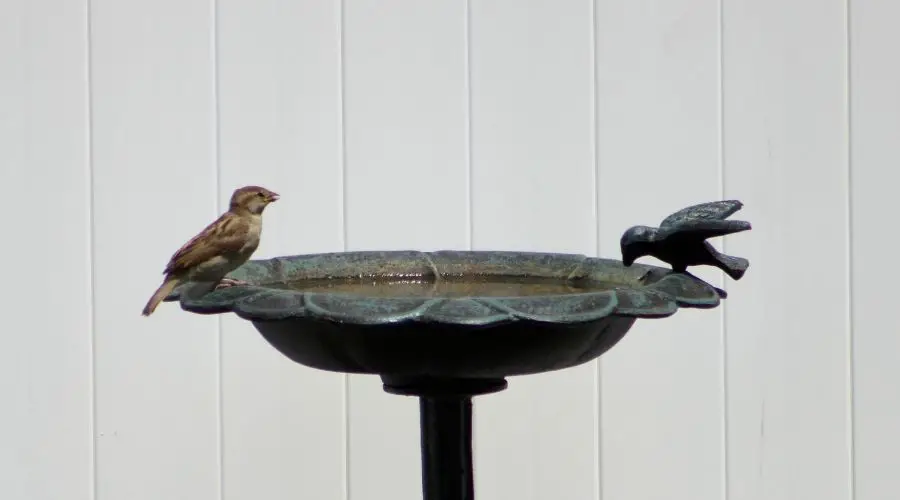
5. Make Water Inaccessible
If you have birdbaths and fountains, you need to make them more inaccessible. You could do that by removing them or repositioning them.
The easiest way to make water features inaccessible is to remove them, of course. But that could compromise the beauty of your yard. So, you could reposition it at the edge of your property to keep raccoons away from your yard.
Alternatively, you can have your fountains and birdbaths renovated and lifted on a pedestal with baffles or greased support system to prevent coons from climbing. You can also cover birdbaths at night to prevent raccoons from drinking the water or insects inside.
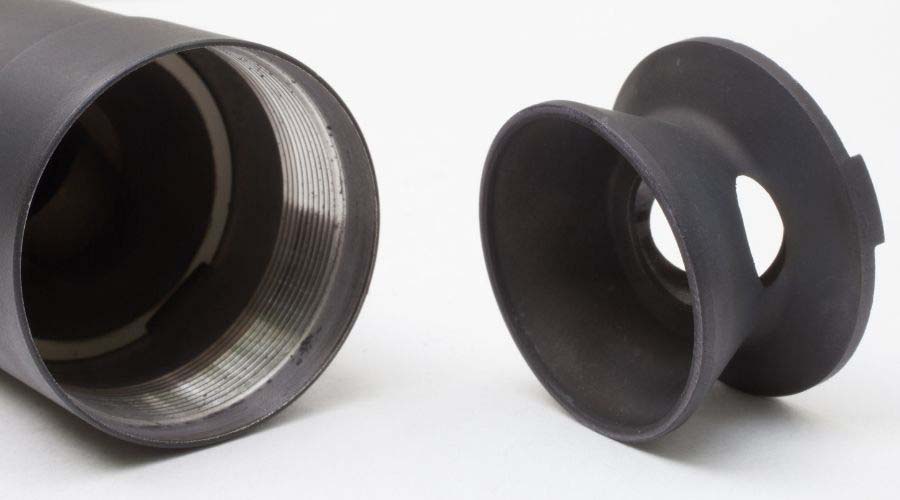
6. Safeguard Your Deck Posts
Your deck posts may be the reason why you have raccoons on your deck. They may use them to climb and rest. For that reason, you should safeguard your deck posts.
You could install baffles to prevent raccoons from quickly climbing up the deck posts to disappear up the roof and into the trees in your property. But installing metal sheets around the posts could also work.
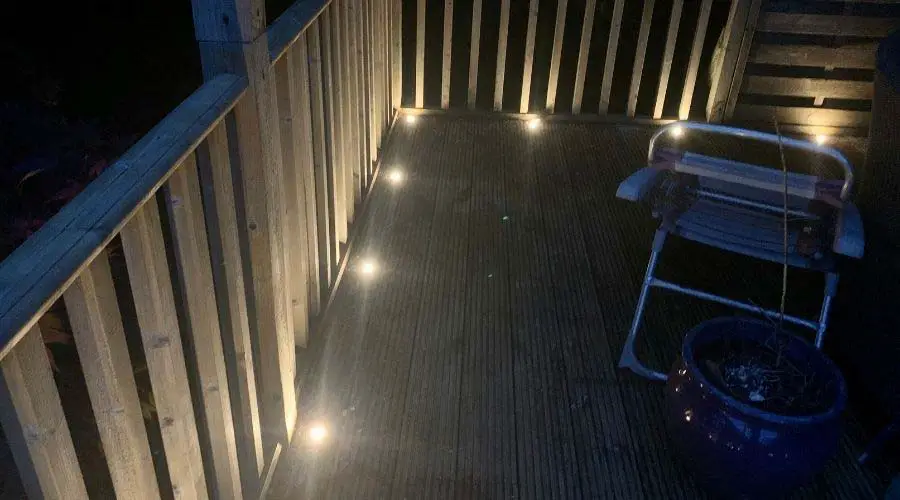
7. Install or Change Your Lighting System
Since raccoons are nocturnal animals, they do not like the light. Therefore, if you want to keep them off, you must light up all the areas in which they are likely to hide.
It would help if you lit up your deck all over to keep the darkness at bay. Then, you can light up your lawn and the edges of your property.
Also, consider installing lights around your swimming pool, fountains, ponds, and chicken coop. But avoid lighting up the birdhouses because it may affect the birds’ behavior.
However, it would be best to consider the effect of the lights you choose. Studies show that CFL, incandescent, and halogen lights attract many insects. Since insects form part of the raccoon diet, you do not want them around.
For that reason, you should avoid using these lights on your deck. Instead, install LED lighting or bug lighting to reduce the number of insects around your outdoor spaces.

8. Plant Beech Trees
Consider planting beech trees if you want to bring in more vegetation into your property while keeping raccoons away.
For raccoons to climb trees, they must have a good grip. But beech trees do not offer the traction these animals need. That is because beech tree barks are too smooth. And coons tend to avoid them.
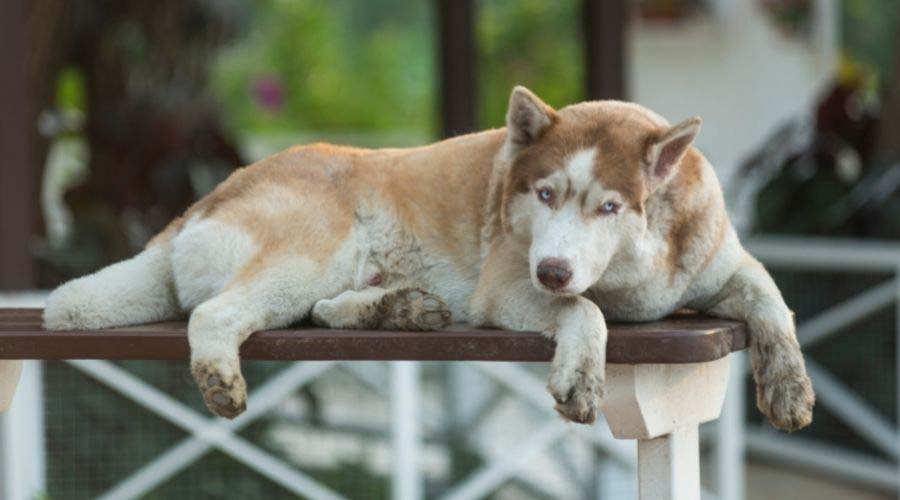
9. Keep Large Dogs
Raccoons do not fear small dogs or cats. They can fight them and may even eat the cats or their kittens. However, larger dogs are a different story.
So, if you are a dog-lover, and have a coon problem, now is the time to get another dog. But this time around, consider a giant dog. Research shows that the sound of barking dogs can scare away raccoons.
It also helps that larger dogs can intimidate these animals who cannot fight or prey on them. If the coons remain scared, they will stay away from your deck.
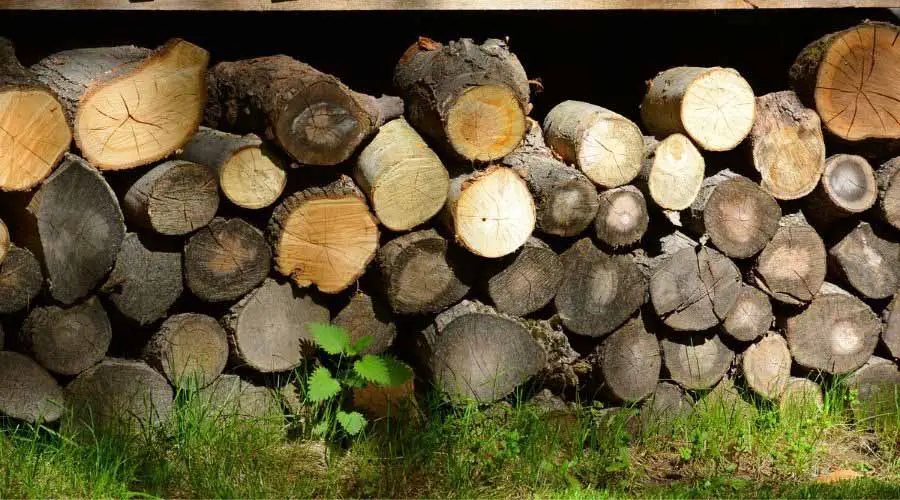
10. Store Firewood the Correct Way
Your firewood piles can encourage rodents like rats to hide. Also, they may provide the dark and warm shelter that snakes like. Where these animals are, so will your raccoons be.
It is also worth noting that your woodpile may be dark and comfortable enough for the critters to make their dens and nurse their young.
Stack your wood tightly to make it harder to move around, and do it far away from your deck. Also, you can restack the wood on pallets higher up, so raccoons find them much more difficult to reach.
11. Use Raccoon Repellants
Many raccoon repellants do not work for long. And they also do not work well when used as the only means of keeping the animals away.
What Scent Will Keep Raccoons Away?
To keep raccoons away, use repellants with other strategies for better results.
For example, you could mix birdfeed with cayenne pepper. While birds will not taste it, raccoons might, making them stay away from that food source. The spice can also be used in a water mixture and sprayed around the deck and other attractants to irritate coons.
You could also use ammonia-soaked rags to help keep raccoons away from places like tree hollows and crawl spaces where they are likely to make their dens.
Try to use or grow strong-smelling plants, such as garlic, onion, and peppermint. Furthermore, you could grow thorny plants around your yard or other attractive plants because they make the coons uncomfortable. These include squash and ivy.
In addition, you could buy raccoon repellant that mimics the urine of predators, such as mountain lions and wolves. You will scare the coons into thinking predators are around by spraying the product. So, they will stay away from your deck and other outdoor spaces.
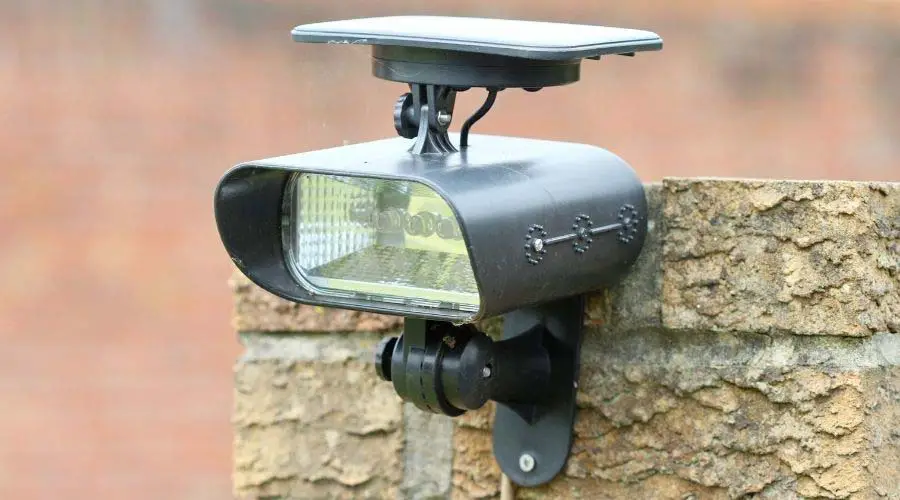
12. Raccoon-Proof Your Deck & Home
If you get rid of raccoons that damage your deck or home, you need to repair and patch up those areas to prevent re-entry. Then you can raccoon-proof them.
You can do the following to safeguard your deck:
- Capping your chimney
- Installing reinforced window and door screens
- Putting metal sheeting around your roofing
- Placing guards around the vents
- Installing motion-sensor lights
- Pruning vegetation near your home’s entry points
- Dig deep around your deck and install a galvanized mesh all around
- Close up burrows using a water and sand mixture
Caution: Handle Raccoons With Care
Due to the dangers that come from dealing with raccoons, it would be wise for you to handle them with care. As previously stated, they are not regular pets and tend to carry rabies.
It would help if you used a catchpole of some kind instead of your bare hands to avoid possible injury. However, trapping and relocating coons are sometimes vulnerable to hunger and predators, meaning they die faster.
It also makes raccoons more likely to transmit diseases, especially if you mishandle them. As a result, some states consider relocation of coons as illegal.
It’s best to hire your local wildlife specialist. They are better equipped to remove raccoons and know all the rules and regulations. And they will find a much better way of getting rid of them.
Final Thoughts
Prevention is always better than cure. If you’re lucky not to have raccoons in your deck, you should do whatever it takes to keep them away for as long as possible.
However, if you have a coon or two, you need to get rid of them first. Since that can be a tricky affair, contacting a professional would be the wisest course of danger.
Sources
